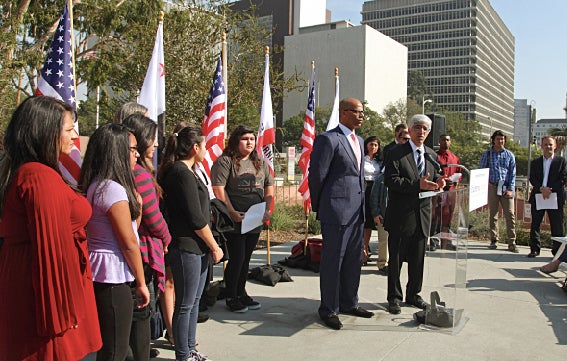LIFO keeps N.J. from true teacher tenure reform

Attorneys and nine California students who sued the state to abolish its teacher tenure laws address the media. (AP Photo/Nick Ut)
Public school calendars may be winding down, but education rhetoric is heating up after a startling ruling last week in Los Angeles that, some pundits say, has national implications. In a case called Vergara v. California, nine Los Angeles public school students argued in County Superior Court that state tenure laws, which require schools to lay off teachers in order of seniority, had violated their constitutional rights by depriving them of effective teachers. Judge Rolf Treu ruled that the students were right.
But New Jerseyans who deplore seniority-based job security, also known as LIFO or “last in, first out,” shouldn’t get ahead of themselves. The Vergara ruling is important and will continue to inform discussions about improving America’s teacher quality and educational equity. But Los Angeles’ tenure laws are so far off the bell curve that they’re hardly a test case for the rest of the nation, even in the 11 states in the country that still adhere to the practice of seniority-based lay-offs.
But don’t underestimate the power of Judge Treu’s declaration that “evidence has been elicited in this trial of the specific effect of grossly ineffective teachers on students. The evidence is compelling. Indeed it shocks the conscience.”
Media outlets, think tanks, and lobbyists across the country jumped in. The National Education Asssociation (NEA) argued that the verdict was “deeply flawed” and “brought by deep-pocketed corporate special interests intent on driving a corporate agenda geared toward privatizing public education and attacking educators.”
Students First, the reform organization run by Michelle Rhee, concurred with Judge Treu that seniority-based job protection “guarantees that great teachers will be taken away from the students who need them.”
More locally, the Star Ledger Editorial Board demanded, “why should a state statute protected by the union be allowed to trump children’s constitutional right to a quality education?”
A spokesperson for Students Matter, the non-profit that funded the lawsuit, confirmed that the organization will next be exploring similar litigation in New Mexico, Oregon, Minnesota, Connecticut, New Jersey and New York. N.J. Senator Joe Kyrillos (R-Monmouth) says that he’s already reached out to the group.
But, as Kathleen Nugent of the N.J. chapter of Democrats for Education Reform told NJ Spotlight, “California’s tenure law is not our tenure law. We can remove ineffective teachers more readily.”
Indeed, according to TEACHNJ, New Jersey’s new tenure law enacted in 2012, teachers are awarded conditional job security after four consecutive years of effective classroom instruction. (In Pennsylvania, that protection is granted after three years.)
In California, however, teachers receive life-long job security after as little as 16 months, the shortest timetable in the country. John Deasy, Superintendent of the Los Angeles Unified School District, testifying for the plaintiffs, noted that “unfortunately, as the state’s education laws have stood, school administrators across the state haven’t had the power to ensure that all classrooms were led by good teachers. Teacher tenure laws have required us to decide whether or not to grant permanent employment to a teacher after just 16 months. That isn’t enough time to decide whether a teacher will be effective over the long haul.”
In New Jersey, districts must provide adequate professional development and mentoring for teachers who fail to demonstrate effective instruction. After a teacher has two years of consecutive “ineffective” ratings, however, superintendents are required to initiate “tenure charges,” which is the process of terminating a teacher with tenure.
In California, according to the Los Angeles Times, “a defense witness conceded that between 1 and 3 percent of teachers in the state are “grossly ineffective.” The court noted that this amounted to as many as 8,000 teachers having “a direct, real, appreciable, and negative impact” on students, particularly poor ones.
TEACHNJ also caps the cost to school boards for removing tenure at $7,500 and expeditiously sends disputes to arbitrators, not administrative courts.
In California, lawyers and experts representing the nine students explained that revoking tenure from a teacher can take from two to ten years and cost as much as $450,000, which dissuades schools from trying to dismiss ineffective teachers. In N.J., according to anecdotal reports, dismissal of ineffective tenured teachers is far more stream-lined than in pre-TEACHNJ days.
So is Vergara v. California irrelevant to N.J.’s ongoing discussions about teacher quality and job security? No, because we still have LIFO. One of the witnesses in the L.A. case was a California Teacher of the Year who had been laid off because she had less seniority than other less effective teachers. N.J. can point to Christina Passwater, an award-winning literacy teacher in Camden who was lost her job to less effective educators when Camden Public Schools reduced staff to accommodate lower student enrollment.
Jack Kerouac famously said, “L.A. is a jungle.” We’re closer to civilization here, but our failure to eliminate LIFO leaves us still in the weeds.
___________________________________________
Laura Waters is president of the Lawrence Township School Board in Mercer County. She also writes about New Jersey’s public education on her blog NJ Left Behind. Follow her on Twitter @NJLeftbehind.
WHYY is your source for fact-based, in-depth journalism and information. As a nonprofit organization, we rely on financial support from readers like you. Please give today.





